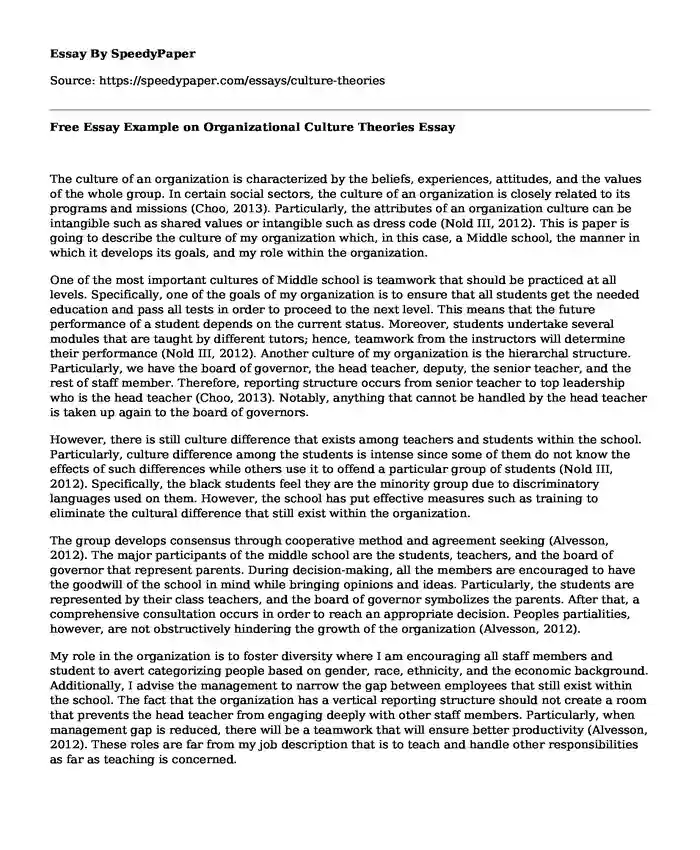
| Type of paper: | Essay |
| Categories: | Management Organizational culture |
| Pages: | 3 |
| Wordcount: | 574 words |
The culture of an organization is characterized by the beliefs, experiences, attitudes, and the values of the whole group. In certain social sectors, the culture of an organization is closely related to its programs and missions (Choo, 2013). Particularly, the attributes of an organization culture can be intangible such as shared values or intangible such as dress code (Nold III, 2012). This is paper is going to describe the culture of my organization which, in this case, a Middle school, the manner in which it develops its goals, and my role within the organization.
One of the most important cultures of Middle school is teamwork that should be practiced at all levels. Specifically, one of the goals of my organization is to ensure that all students get the needed education and pass all tests in order to proceed to the next level. This means that the future performance of a student depends on the current status. Moreover, students undertake several modules that are taught by different tutors; hence, teamwork from the instructors will determine their performance (Nold III, 2012). Another culture of my organization is the hierarchal structure. Particularly, we have the board of governor, the head teacher, deputy, the senior teacher, and the rest of staff member. Therefore, reporting structure occurs from senior teacher to top leadership who is the head teacher (Choo, 2013). Notably, anything that cannot be handled by the head teacher is taken up again to the board of governors.
However, there is still culture difference that exists among teachers and students within the school. Particularly, culture difference among the students is intense since some of them do not know the effects of such differences while others use it to offend a particular group of students (Nold III, 2012). Specifically, the black students feel they are the minority group due to discriminatory languages used on them. However, the school has put effective measures such as training to eliminate the cultural difference that still exist within the organization.
The group develops consensus through cooperative method and agreement seeking (Alvesson, 2012). The major participants of the middle school are the students, teachers, and the board of governor that represent parents. During decision-making, all the members are encouraged to have the goodwill of the school in mind while bringing opinions and ideas. Particularly, the students are represented by their class teachers, and the board of governor symbolizes the parents. After that, a comprehensive consultation occurs in order to reach an appropriate decision. Peoples partialities, however, are not obstructively hindering the growth of the organization (Alvesson, 2012).
My role in the organization is to foster diversity where I am encouraging all staff members and student to avert categorizing people based on gender, race, ethnicity, and the economic background. Additionally, I advise the management to narrow the gap between employees that still exist within the school. The fact that the organization has a vertical reporting structure should not create a room that prevents the head teacher from engaging deeply with other staff members. Particularly, when management gap is reduced, there will be a teamwork that will ensure better productivity (Alvesson, 2012). These roles are far from my job description that is to teach and handle other responsibilities as far as teaching is concerned.
References
Alvesson, M. (2012). Understanding organizational culture. Sage.
Choo, C. W. (2013). Information culture and organizational effectiveness.International Journal of Information Management, 33(5), 775-779.
Nold III, H. A. (2012). Linking knowledge processes with firm performance: Organizational culture. Journal of Intellectual Capital, 13(1), 16-38.
Cite this page
Free Essay Example on Organizational Culture Theories. (2019, Jun 24). Retrieved from https://speedypaper.com/essays/culture-theories
Request Removal
If you are the original author of this essay and no longer wish to have it published on the SpeedyPaper website, please click below to request its removal:
- Free Essay Sample Concerning Hate Crimes
- Acid Base Balance Essay Example
- Free Essay on Philosophy Questions
- Essay Sample Answering Why Look at Animals through the Viewpoint of Winged Migration
- Weber's Ideas on Inequality - Free Essay on Sociology
- Free Essay on Cheap Solution of Acoustic Treatment for Small Church
- Free Essay Example - Craft of Writing
Popular categories




